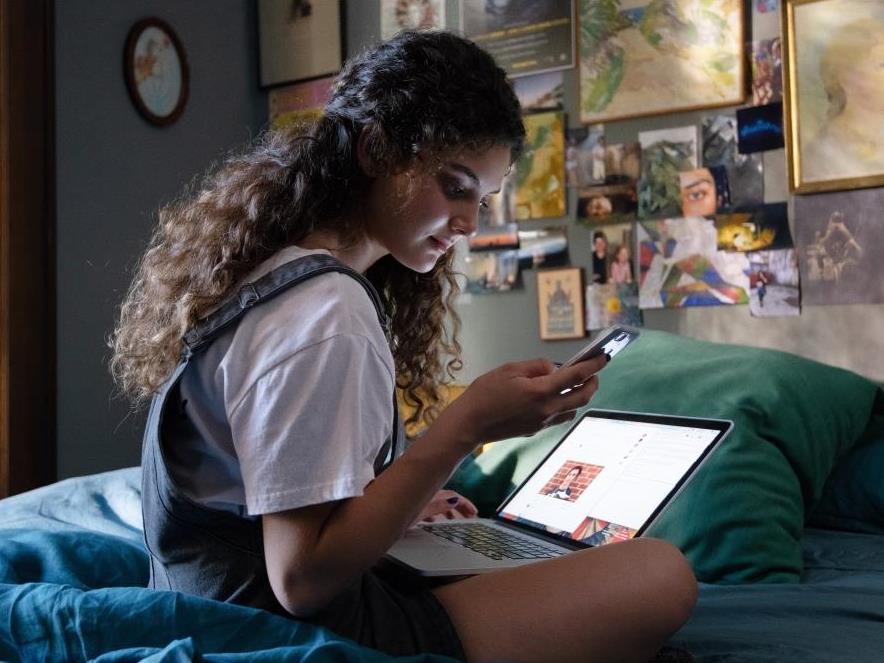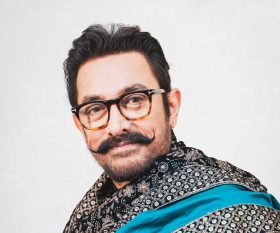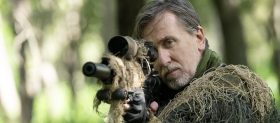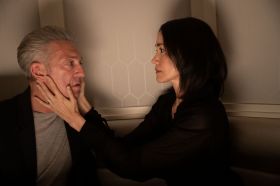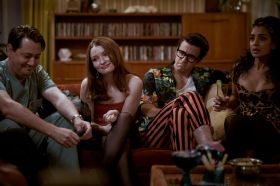Image: Living in a gleefully hypersexual world. Luca Sardelis in The Hunting. Source: SBS.
With the conspicuous exception of Canada, thanks to a turn-of-the-millennium supreme court decision, the puritan Anglo countries of the world reserve the right to treat teenage ‘sexters’ as child pornographers; as felons and sex offenders to be registered. Teens are routinely prohibited from photographing what they are legally permitted to do in the flesh. But, as Amy Hasinoff brilliantly argued at the start of this decade, if underage sexting is illegal for everyone, it lets abusive sexters off the hook.
Three years before her book Sexting Panic: Rethinking Criminalization, Privacy, and Consent was published, Hasinoff wrote: “One of the ways that abusive sexters avoid blame is because of the idea that no teenager should be creating sexting images in the first place. This leads to the problematic consensus in mass media and law that everyone involved in sexting – regardless of whether their behavior was consensual or abusive – is equally guilty of wrongdoing.” [my emphasis]
In other words, an intimate sharing can – and will – be treated in the same way as an abusive uploading designed to objectify and humiliate.
Four-part SBS drama The Hunting begins with a schoolroom incident that results in the expulsion of a boy and the suspension of his ex-girlfriend, both Year 11 students. The police are called by the principal after the girl circulates a ‘dick pic’ the boy has previously shared with her. It’s the first – and by far the least least – of the many betrayals of trust and privacy to come.
Created by Sophie Hyde and Matthew Cormack (whose Sundance and Crystal Bear winning movie 52 Tuesdays touched on similarly thorny territory) and written by Cormack and Niki Aken (Janet King, Anzac Girls), The Hunting recreates the schoolboy porn ring story that hit the news in the winter of 2016. Students from 90-odd schools around the country were caught up in the scandal. Thousands of photographs of young women had been shared and traded on a message board without their knowledge or consent. Girls were doxed and quite literally hunted down. Bounties were offered for explicit images of specific individuals. Nude shots were ‘wins’. The Australian Federal Police had some initial success in closing the site down, but it reappeared a fortnight later on an overseas server.
In The Hunting, private school boys upload explicit images to a message board called Our Local Sluts. The comments the boys leave on the pictures would make Larry Flynt blush.
When a new and popular teacher at an Adelaide high school (played by the increasingly ubiquitous Sam Reid) discovers the site, he is torn between his loyalty to his male and female students and his blazing anger. His senior colleague Eliza (Jessica De Gouw), by contrast, sees an opportunity for ‘real consequences’ for ‘men’s behaviour’.Pamela Rabe (Wentworth) plays the harried and out-of-her-depth principal. When she convenes an assembly to discuss cyber safety, it degenerates into a haranguing about appropriate skirt length and modesty. If you think that sounds comically far-fetched, you’d be dead wrong. The story is lifted from a Facebook post by a parent of a girl at a Berwick college at the height of the 2016 panic. (There, the skirt-policing principal was male.)
Though The Hunting is equivocal in its overall treatment of teen sexuality – there’s no attempt to reframe girls’ desire and agency as positive and expressive rather than exhibitionistic and risky self-sexualisation – it is not an exercise in slut shaming. The greatest victims, conspicuously, are not even your run-of-the-mill selfie-taking attention-seekers.
Zoe (Luca Sardelis) and Amandip (Kavitha Anandasivam) are undoubtedly victims here, but they are smart, articulate and – finally – incandescent in their rage and indignation.
Together with director Ana Kokkinos (Head On) and DOP Bonnie Elliott (Romper Stomper, Seven Types of Ambiguity), Hyde and her team have created a rich and authentic world of lusty women and intimidated and/or ineffectual men.
Zoe and ‘Dip’ live in a gleefully hypersexual world. Zoe’s pregnant second mum Jada (Anna Lindner) redefines the word ‘inappropriate’ as she tells the teen about her tastes in porn. The deputy principal at Amandip’s school (de Gouw) attempts to finger her boyfriend during their first sexual encounter. When he flinches, she smirks: ‘You do not want to be a man who is uncomfortable about that.’ Rather than consenting, he merely obeys.
Zoe and Dip are students at different schools. Their fates are linked through the boys they are seeing. Dip’s serious and adoring boyfriend Nassim (Yazeed Daher) is a childhood friend of Andy, a ‘jock’ that Zoe has been having cam-sex with. Andy (Alex Cusack) is the wildcard in the deck. He’s white, wealthy, sporty and entitled… and entirely unpredictable owing to his lack of self-knowledge. His vindictiveness and misogyny spring all-too-readily out of his immaturity.
Andy’s nuclear family is like an anti-microcosm of the world. Andy boorishly tries to police the behaviour of his mother Simone (Asher Keddie) in a clumsy facsimile of his father Nick’s behaviour. Simone is cautious, even buttoned-up, but finds herself in the sexualised role of fundraiser at work, flirting for a living.
Nick (Richard Roxburgh) tries to shoe-horn her into a cripplingly tight lamé frock. The metaphors work overtime, but they are far from laboured. Nick covers up his boy’s misdeeds, hiding evidence from both Simone and the police. He deceives his wife with such facility that her suspicion and anger melt into contrition and gratitude.
Hairline cracks appear in the third episode – ‘#shittyboys’ – which is co-written by Aken and Cormack. (The first two episodes are credited, individually, to Cormack and Aken respectively.) The sledgehammer blows become cheap shots. Instead of consoling her, Dip’s loyal bestie chides her, disgusted: ‘you kept your face in it.’ (i.e. in the naked selfie she sent to Nassim.) And, disappointingly, the only radical feminist voice in the series becomes more and more garbled and ridiculous.
Unusually, just three of the four episodes have been made available for review, ostensibly to head off spoilers. Had I been part of the PR team, I reckon I would have only released two. They are, pound for pound, two of the highest quality hours of free-to-air television I’ve ever encountered. (Seriously. I’m scratching my head thinking: Edge of Darkness? Phoenix? Janus? Series from the 1980s and ’90s.)
The Hunting is an extremely rare event in Australian television history. The power and topicality of the story are more than matched by the quality of the writing and craft of the production. It’s as hot and urgent as it is considered. As we’ve come to expect from anything directed by Ana Kokkinos, the acting in The Hunting is vivid and harrowingly truthful, especially from Sardelis, Anandasivam and the younger cast members.
| 4.5 stars |
★★★★☆
|
The Hunting
Created by Sophie Hyde and Matthew Cormack.
Closer Productions.
Australia, 2019, 4 episodes
Premieres Thursday, August 1 at 8:30pm on SBS and SBS On Demand.
Actors:
Director:
Format:
Country:
Release:
